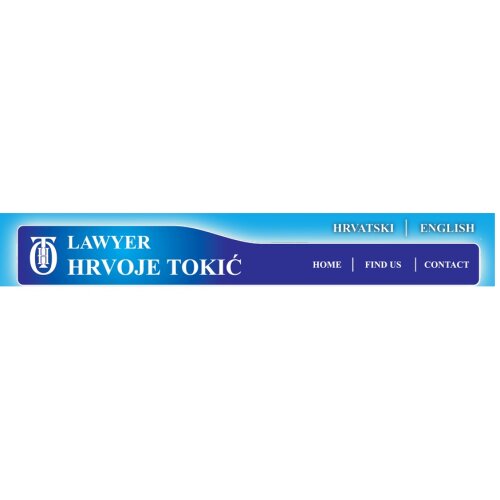Best Sanctions & Export Controls Lawyers in Croatia
Share your needs with us, get contacted by law firms.
Free. Takes 2 min.
Or refine your search by selecting a city:
List of the best lawyers in Croatia
About Sanctions & Export Controls Law in Croatia
Sanctions and export controls law in Croatia governs the import, export, transfer, and transit of goods, services, technologies, and finances that are subject to international or national restrictions. These laws aim to support both domestic policy and international commitments Croatia has undertaken as a member of the European Union (EU) and United Nations (UN). Croatia enforces a range of targeted sanctions, such as asset freezes or trade bans, and controls the export of dual-use items, military goods, and technologies that could be misused or diverted.
Why You May Need a Lawyer
Many individuals and businesses encounter situations where an understanding of sanctions and export controls is essential. You may require legal guidance if you plan to export goods or technologies, are involved in international shipping or logistics, have business partners in sanctioned countries, or face allegations of violations. A lawyer can help you interpret complex regulations, secure the correct licenses, manage compliance audits, or represent you before administrative and criminal proceedings if necessary. Early legal advice can prevent costly mistakes and reputational damage.
Local Laws Overview
Croatian sanctions and export controls primarily operate within the framework of EU law, which Croatia fully implements and enforces through its national legislation and authorities. Key laws and regulations to be aware of include the Act on Restrictive Measures, the Control of Exports of Dual-Use Goods Act, and corresponding bylaws. The Ministry of Foreign and European Affairs oversees policy and implementation, while the Customs Administration and other agencies are responsible for enforcement and inspections. Violations of sanctions or export control laws can lead to administrative measures, fines, and in serious cases, criminal prosecution.
Sanctions can include trade embargos, prohibitions of investment, asset freezes, and restrictions on the movement of persons. Export controls require the registration and licensing of certain strategic goods and technologies before they can be transferred outside of Croatia or the EU, especially items listed as dual-use or military-grade. Companies must conduct due diligence to check end-use and end-users to avoid accidental breaches of the law.
Frequently Asked Questions
What are dual-use goods, and how are they regulated in Croatia?
Dual-use goods refer to items, software, and technologies that have both civilian and military applications. In Croatia, these goods are regulated under the Control of Exports of Dual-Use Goods Act and corresponding EU regulations. Exporting them outside the EU requires a license from the competent authorities.
Who enforces sanctions and export controls in Croatia?
The Ministry of Foreign and European Affairs is the primary authority. Enforcement is supported by the Customs Administration, Ministry of Economy and Sustainable Development, and other relevant government agencies.
What happens if I violate sanctions or export controls regulations?
Violations can lead to administrative penalties, confiscation of goods, fines, and, in severe cases, criminal charges. Individuals and companies may also face reputational damage and loss of business licenses.
How do I know if a business partner or country is subject to sanctions?
It is crucial to review the latest lists of sanctioned individuals, companies, and countries published by the EU and Croatian authorities. Regularly updated information can be obtained from official government websites or by consulting a legal expert.
Do I need a license to export technology or software from Croatia?
Yes, certain types of technology or software, especially those considered dual-use or military-grade, require an export license. The licensing process involves detailed documentation and an assessment of the end-use and end-user.
What are end-use and end-user controls?
End-use and end-user controls are measures to ensure exports do not reach prohibited or unintended recipients or are not used for purposes contrary to international security or human rights objectives.
Can financial transactions be subject to sanctions?
Yes, sanctions in Croatia and the EU often include financial restrictions, such as prohibiting transactions with designated persons or entities, freezing assets, and restricting access to banking services.
What should I do if contacted by a government agency about my exports?
Contact a specialist lawyer immediately. Do not provide information or documents before obtaining legal advice. A lawyer can help you respond properly and protect your interests.
Are there exemptions or humanitarian exceptions in sanctions law?
Certain sanctions regimes include exceptions for humanitarian aid, medical supplies, or specific personal transactions. These exemptions are strictly defined and usually require prior authorization.
How can companies ensure compliance with sanctions and export controls?
Businesses should implement internal compliance programs, conduct regular training, screen business partners, utilize up-to-date lists of restrictions, and seek expert advice when expanding into new markets or exporting sensitive goods.
Additional Resources
There are several resources and authorities available to provide information and support regarding sanctions and export controls in Croatia:
- Ministry of Foreign and European Affairs - official source for policies and implementation
- Customs Administration - responsible for controlling the movement of goods at borders
- Ministry of Economy and Sustainable Development - handles certain licensing procedures
- Croatian Chamber of Economy - offers guidance for exporters and importers
- Official Journal of the Republic of Croatia - publication for laws, regulations, and official communications
- European Union Sanctions Map and EUR-Lex - for EU legislation and up-to-date sanction regimes
Next Steps
If you believe you need legal assistance with sanctions or export controls in Croatia, consider taking the following steps:
- Gather all relevant documents and information about your goods, technologies, business partners, and transactions
- Review your existing compliance procedures and any correspondence from authorities
- Contact a lawyer specializing in sanctions and export controls law, preferably one with experience in EU and Croatian regulations
- Schedule a consultation to assess your specific situation and receive tailored advice
- Follow your lawyer's recommendations for compliance upgrades, applications for licenses, or defense against allegations if needed
Early professional guidance helps prevent violations, enables smoother business operations, and ensures your activities remain compliant with Croatian and international law.
Lawzana helps you find the best lawyers and law firms in Croatia through a curated and pre-screened list of qualified legal professionals. Our platform offers rankings and detailed profiles of attorneys and law firms, allowing you to compare based on practice areas, including Sanctions & Export Controls, experience, and client feedback.
Each profile includes a description of the firm's areas of practice, client reviews, team members and partners, year of establishment, spoken languages, office locations, contact information, social media presence, and any published articles or resources. Most firms on our platform speak English and are experienced in both local and international legal matters.
Get a quote from top-rated law firms in Croatia — quickly, securely, and without unnecessary hassle.
Disclaimer:
The information provided on this page is for general informational purposes only and does not constitute legal advice. While we strive to ensure the accuracy and relevance of the content, legal information may change over time, and interpretations of the law can vary. You should always consult with a qualified legal professional for advice specific to your situation.
We disclaim all liability for actions taken or not taken based on the content of this page. If you believe any information is incorrect or outdated, please contact us, and we will review and update it where appropriate.
Browse sanctions & export controls law firms by city in Croatia
Refine your search by selecting a city.

















